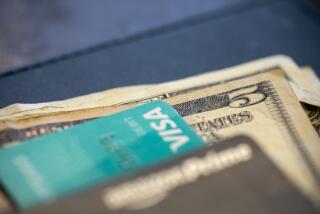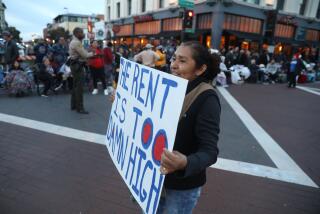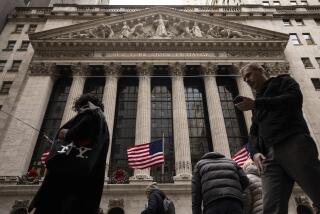Americans expect a recession but also survival
Americans are more worried about the nation’s fiscal health than they are about their own pocketbooks, with a sizable majority believing the country is on the road to recession, a Los Angeles Times/Bloomberg poll has found.
The anxiety Wall Street is feeling from the mortgage crisis, housing slump and high oil prices is resonating with more than two-thirds of adults surveyed, who think the economy is performing badly. An even greater percentage -- 79% -- are convinced a recession is likely within the next year.
But two-thirds of adults also say they have yet to feel the effects of that dour forecast, rating their personal situation as secure.
The level of confidence rises with income. Among adults earning more than $100,000 a year, 92% feel safe, while more than half of those bringing in less than $40,000 a year describe their finances as “shaky.”
Experts attribute the prevailing optimism in the face of an economic storm to the fact that many more Americans survive recessions unscathed than are harmed by them -- particularly those in two-income households with fixed mortgage rates and stable jobs.
“Those folks are not in bad shape, and they don’t have much to fear about the recession,” said Gus Faucher, an economist at Moody’s Economy.com. “Recessions put millions out of work, but there are many more people who keep their jobs.”
The economic mood has flipped from a year ago, when a Times/Bloomberg poll showed two-thirds of adults saw the economy as doing well.
Even so, in an apparent sign of enduring confidence, a slight majority of respondents in the current poll had no plans to tighten their belts, saying they expected to spend the same amount on purchases in six months as they do today. And one-fifth expected to spend more.
Poll respondent Richard Melecki, 59, of Ohio said he felt “virtually recession-proof.” His wife is a tenured teacher, and he has a financial consulting businesses that does better in hard times, as long as they don’t last too long.
But he is worried for the country. “We have a gigantic financial hole in the boat, and that is Iraq,” he said.
History is in his corner. The last two recessions -- in 1990 and 2001 -- were short and shallow, and the expansions that followed were long and lucrative, Faucher said. That rather recent track record could leave many Americans feeling there is cause for concern but not panic, despite the alarm bells blaring on Wall Street and dramatized on the nightly news.
But history is little comfort to households struggling to make ends meet, like the one Dorothy J. Thomas runs in Birmingham, Ala. A 53-year-old disabled woman with custody of her six grandchildren, she gets by on Social Security checks and government subsidies, which do not rise as the children grow.
The cost of school uniforms, shoes and other items climbs with that for food, gas and utilities. She is worried.
“Right now, I can get by. But if the recession comes, where does that leave us?” she said. “Things keep going up, but what we get doesn’t go up with it.”
The survey, conducted under the supervision of Los Angeles Times poll director Susan Pinkus, interviewed 1,541 adults from Jan. 18 through Tuesday. The margin of error was plus or minus 3 percentage points.
Asked about the best remedy for the nation’s economic woes, respondents named a number of solutions, but the one most often mentioned was a one-time tax rebate like the one announced Thursday as part of a joint stimulus package cobbled together by Congress and the White House.
Asked who or what was to blame for the downturn, respondents pointed to a similar array of culprits, including a weak dollar and the trade deficit. But President Bush was most often mentioned -- by 19% -- with mortgage lenders coming in second at 15%.
faye.fiore
@latimes.com
More to Read
Start your day right
Sign up for Essential California for news, features and recommendations from the L.A. Times and beyond in your inbox six days a week.
You may occasionally receive promotional content from the Los Angeles Times.






